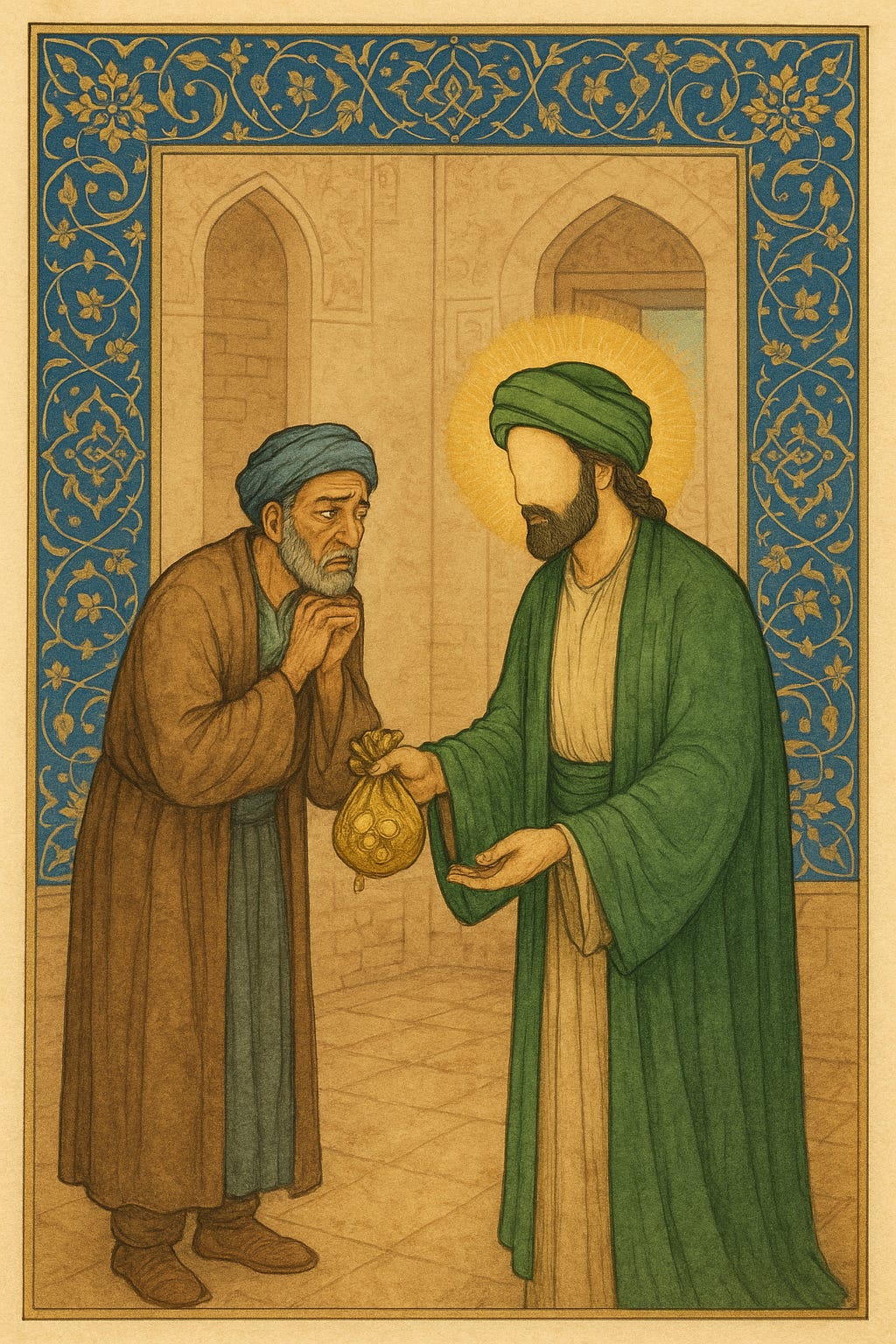Kareem Ahl al-Bayt: The Generosity of Imam Hasan (AS)
How Imam Hasan ibn Ali (AS) taught us the dignity of giving without delay, judgment, or humiliation
Among the many noble titles given to the family of the Prophet Muhammad (S), none shine more gently yet powerfully than “Kareem Ahl al-Bayt”—the Most Generous of the Prophet’s Household—a title bestowed upon Imam Hasan ibn Ali (AS), the beloved eldest grandson of the Prophet (S). This was not merely a name, but a lived legacy of compassion, urgency in giving, and the preservation of human dignity.
Who Was Imam Hasan (AS)?
Imam Hasan (AS) was the son of Imam Ali ibn Abi Talib (AS) and Lady Fatimah al-Zahra (SA), the daughter of the Prophet Muhammad (S). Born in the holy city of Madinah in the year 3 AH, he was the first grandson of the Prophet (S), who loved him dearly. The Prophet would often say:
"Hasan and Husayn are the leaders of the youth of Paradise."
(Sunan al- Tirmidhi, Hadith 3768)
Imam Hasan (AS) was known for his wisdom, patience, and immense generosity. In a world where charity is often filtered through bureaucracy, suspicion, and delay, Imam Hasan (AS) embodied a radical form of giving—quick, unconditional, and deeply respectful.
A Stranger in Distress
One day, as the historical narrations report, a man came to Imam Hasan (AS), clearly distressed and worried. His words were heavy with shame: he had fallen into serious debt and feared that he would lose not just his home, but his dignity in the eyes of society.
Without interrogating him or asking for verification, Imam Hasan (AS) reached into his own wealth and gave the man enough money to clear all his debts and live in comfort. The man wept with relief and gratitude, saying:
"You have not only cleared my debt, but you have saved my dignity."
The moment was both emotional and illuminating.
Giving Without Shame or Delay
Later, when someone asked Imam Hasan (AS) why he gave without even questioning the man’s background or story, the Imam responded:
"I heard my grandfather, the Prophet (S), say: 'Do not let a believer ask for help and leave him empty-handed, for his honour is tied to his faith.'"(Bihar al-Anwar, vol. 78)
This statement reflects a deeper philosophy rooted in the Quran and the Sunnah: charity is not just about money—it is about protecting the heart, honour, and dignity of another believer.
Imam Hasan (AS) saw wealth not as something to be hoarded, but as a trust, a tool to bring ease to others. He once said:
"I am ashamed before my Lord to see a believer asking for help, and I delay in helping him."
The Painful End: Betrayed by His Own
Despite his nobility and unmatched generosity, Imam Hasan (AS) lived a life filled with betrayal and heartache. After the martyrdom of his father, Imam Ali (AS), Imam Hasan was declared Caliph in Kufa. However, internal betrayal weakened his position—many of his own followers deserted him and some even conspired with the enemy, Mu’awiyah ibn Abi Sufyan, for personal gain.
To prevent further bloodshed among Muslims, Imam Hasan (AS) reluctantly signed a peace treaty with Mu’awiyah, under harsh and unjust conditions. Yet even this treaty was violated. The people who had once pledged loyalty to him mocked him and called him weak.
The betrayal went even further—his own wife, coerced by the promise of wealth from Mu’awiyah, poisoned him. He spent days in agony before finally returning to his Lord. He was only 47 years old.
His request to be buried beside his grandfather, the Prophet (S), was denied due to the politics of the time, and arrows were even fired at his funeral procession. Eventually, he was laid to rest in Jannat al-Baqi.
The True Spirit of Generosity
The lesson of Imam Hasan’s story is especially urgent today. In an age of social media scrutiny, performative charity, and delayed responses, the Imam teaches us that real generosity is quiet, fast, and respectful. It does not pry. It does not shame. It lifts others before they fall further.
The Prophet’s household did not just give — they preserved dignity with their giving. That is why Imam Hasan became known as:
"Kareem Ahl al-Bayt"
(The Most Generous of the Prophet's Family)
Final Reflection
When we give, do we wait for someone to justify their pain? Do we make them beg? Do we doubt their intentions? Imam Hasan (AS) teaches us to do the opposite: trust, give quickly, and protect honour.
Let us remember that generosity is not measured in how much we give—but in how we give. And in this, the shining example of Imam Hasan (AS) remains unmatched.
O Allah, grant us the manners of the Ahlul Bayt. Make our hands open, our hearts soft, and our wealth a means of relieving others—not just enriching ourselves.
Quran Reference
"And they give food in spite of love for it to the needy, the orphan, and the captive, saying, 'We feed you only for the countenance of Allah. We wish not from you reward or gratitude.'"
(Quran, Surah al-Insan, Chapter 76, The Man, Verse 8–9)


